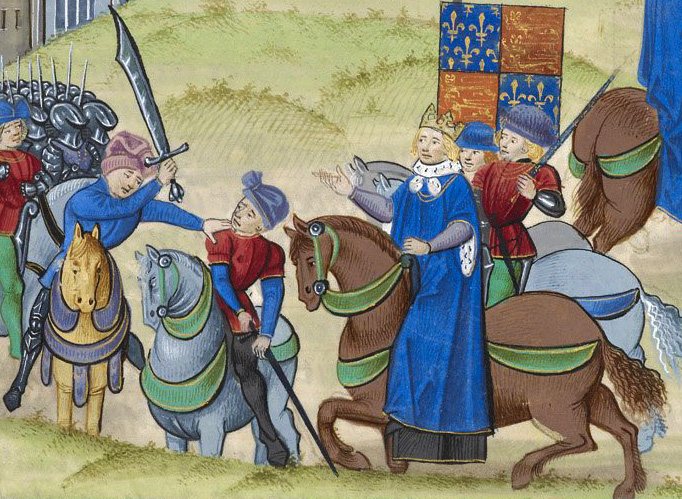Wat Tyler or Walter Tyler was the leader of the Peasants' Revolt in 1381. This was a protest against the poll tax of the time and a push for social reform and greater equality. As a result of the revolt Wat Tyler became a local hero. There is a pub in Dartford named after him where it is suggested he spent time.


The Peasants' Revolt began 35 years after the Black Death had decimated Europe resulting in labour shortages. Peasants realised that there was a shortage of people to work the land and wanted better pay and conditions. The government passed a law to stop wage rises and to make matters worse a poll tax was introduced to support the war with France. Three times in four years the tax was demanded so that everybody over the age of 15 irrespective of their earnings had to pay 4 pence. This disproportionately affected the poor and peasants encouraged by the teaching of John Ball a radical priest were led to take action.
When a tax collector arrived in an Essex village the people did not take to it well. It is said that he assaulted the daughter of a similarly named man to Wat (also of the surname Tyler) to see if she had reached puberty. In revenge he killed the tax collector. Villagers in the South East of England began to gather and decided to march to London to demand of the King better wages. Peasants from Essex, Norfolk and Suffolk travelled via Chelmsfortd to London. Those from Kent having first attacked Rochester Castle then Canterbury travelled to Blackheath. It is thought more than 60,000 people were involved in the revolt.
The peasants destroyed tax records and beheaded tax officials on their journey. Buildings with government records were burnt and during this time Wat Tyler began to lead the people. The King, who was only 14 at the time, agreed to meet Wat Tyler at Mile End Road on 14th June. He conceeded to the peasants much of their demands provided they return home in peace. The rebels meanwhile marched to the Tower of London beheading Simon Sudbury, the Archbishop of Canterbury and Robert Hales, the treasurer. That night King Richard II spend in hiding. The next day the King and Wat Tyler met once more at Smithfield. The Lord Mayor William Walworth slashed Wat with a dagger and he was taken to St Bartholomew's Hospital. He was brought back to Smithfield by the mayor and decapitated.
The peasants appeased by the King began to return home at his request. He did not keep his promises and wishing to make an example of the rebels decapitated the remaining ring leaders. After the revolt although the hierarchy of feudalism did not end it began to decline and so there was fairer treatment of the working classes.
 |
| Source: Wikipedia |
Sources:
Wikipedia- Peasants' Revolt
Bitesize - The Peasants' Revolt
Historic UK- Wat Tyler and the Peasants' Revolt
History Extra: Your guide to the Peasants' revolt of 1381

Comments
Post a Comment